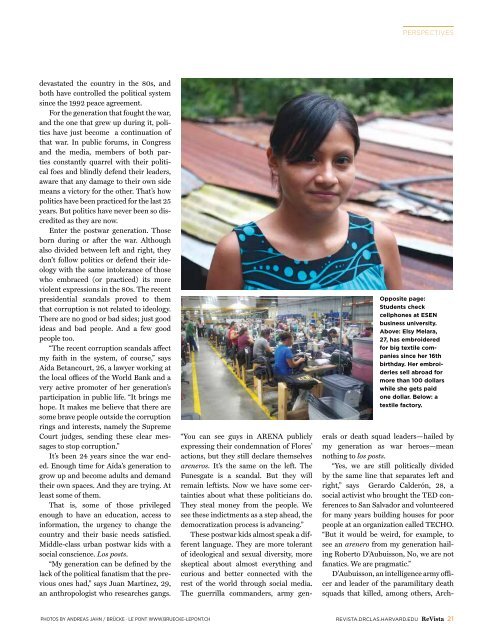EL SALVADOR
8clowSgZh
8clowSgZh
Create successful ePaper yourself
Turn your PDF publications into a flip-book with our unique Google optimized e-Paper software.
PERSPECTIVES<br />
devastated the country in the 80s, and<br />
both have controlled the political system<br />
since the 1992 peace agreement.<br />
For the generation that fought the war,<br />
and the one that grew up during it, politics<br />
have just become a continuation of<br />
that war. In public forums, in Congress<br />
and the media, members of both parties<br />
constantly quarrel with their political<br />
foes and blindly defend their leaders,<br />
aware that any damage to their own side<br />
means a victory for the other. That’s how<br />
politics have been practiced for the last 25<br />
years. But politics have never been so discredited<br />
as they are now.<br />
Enter the postwar generation. Those<br />
born during or after the war. Although<br />
also divided between left and right, they<br />
don’t follow politics or defend their ideology<br />
with the same intolerance of those<br />
who embraced (or practiced) its more<br />
violent expressions in the 80s. The recent<br />
presidential scandals proved to them<br />
that corruption is not related to ideology.<br />
There are no good or bad sides; just good<br />
ideas and bad people. And a few good<br />
people too.<br />
“The recent corruption scandals affect<br />
my faith in the system, of course,” says<br />
Aída Betancourt, 26, a lawyer working at<br />
the local offices of the World Bank and a<br />
very active promoter of her generation’s<br />
participation in public life. “It brings me<br />
hope. It makes me believe that there are<br />
some brave people outside the corruption<br />
rings and interests, namely the Supreme<br />
Court judges, sending these clear messages<br />
to stop corruption.”<br />
It’s been 24 years since the war ended.<br />
Enough time for Aída’s generation to<br />
grow up and become adults and demand<br />
their own spaces. And they are trying. At<br />
least some of them.<br />
That is, some of those privileged<br />
enough to have an education, access to<br />
information, the urgency to change the<br />
country and their basic needs satisfied.<br />
Middle-class urban postwar kids with a<br />
social conscience. Los posts.<br />
“My generation can be defined by the<br />
lack of the political fanatism that the previous<br />
ones had,” says Juan Martínez, 29,<br />
an anthropologist who researches gangs.<br />
Opposite page:<br />
Students check<br />
cellphones at ESEN<br />
business university.<br />
Above: Elsy Melara,<br />
27, has embroidered<br />
for big textile companies<br />
since her 16th<br />
birthday. Her embroideries<br />
sell abroad for<br />
more than 100 dollars<br />
while she gets paid<br />
one dollar. Below: a<br />
textile factory.<br />
“You can see guys in ARENA publicly<br />
expressing their condemnation of Flores’<br />
actions, but they still declare themselves<br />
areneros. It’s the same on the left. The<br />
Funesgate is a scandal. But they will<br />
remain leftists. Now we have some certainties<br />
about what these politicians do.<br />
They steal money from the people. We<br />
see these indictments as a step ahead, the<br />
democratization process is advancing.”<br />
These postwar kids almost speak a different<br />
language. They are more tolerant<br />
of ideological and sexual diversity, more<br />
skeptical about almost everything and<br />
curious and better connected with the<br />
rest of the world through social media.<br />
The guerrilla commanders, army generals<br />
or death squad leaders—hailed by<br />
my generation as war heroes—mean<br />
nothing to los posts.<br />
“Yes, we are still politically divided<br />
by the same line that separates left and<br />
right,” says Gerardo Calderón, 28, a<br />
social activist who brought the TED conferences<br />
to San Salvador and volunteered<br />
for many years building houses for poor<br />
people at an organization called TECHO.<br />
“But it would be weird, for example, to<br />
see an arenero from my generation hailing<br />
Roberto D’Aubuisson, No, we are not<br />
fanatics. We are pragmatic.”<br />
D’Aubuisson, an intelligence army officer<br />
and leader of the paramilitary death<br />
squads that killed, among others, Arch-<br />
PHOTOS BY ANDREAS JAHN / BRÜCKE · LE PONT WWW.BRUECKE-LEPONT.CH<br />
REVISTA.DRCLAS.HARVARD.EDU ReVista 21


